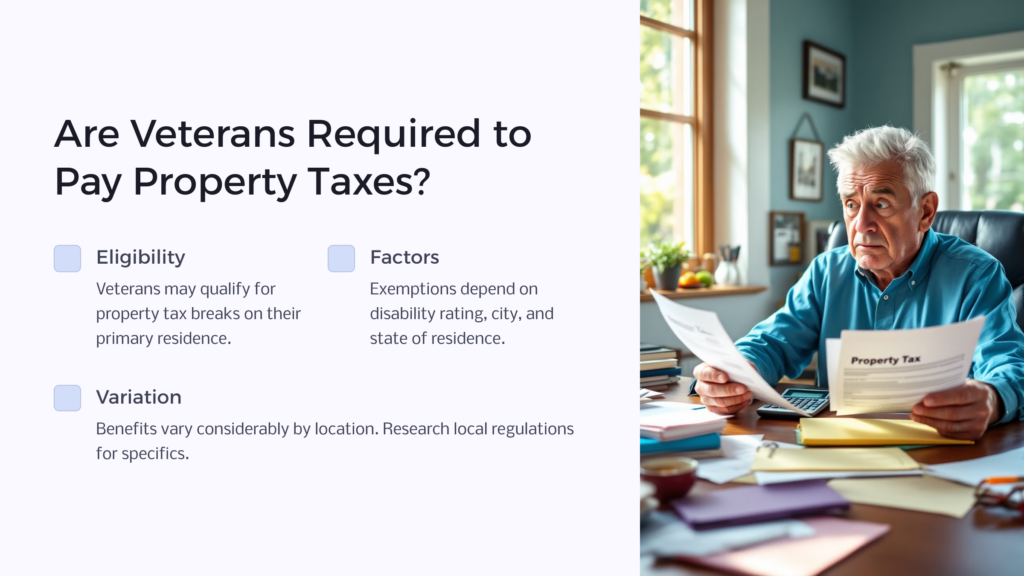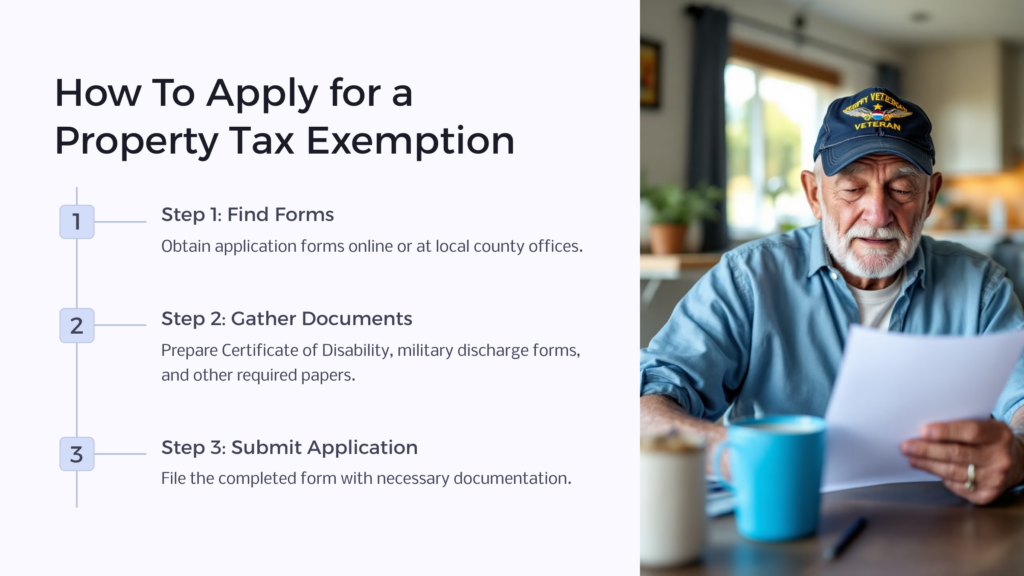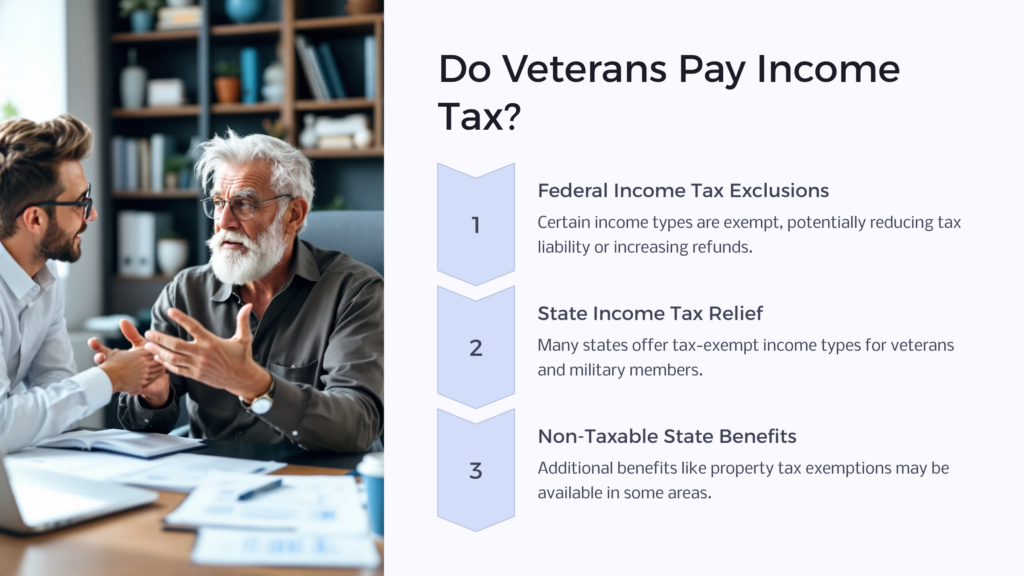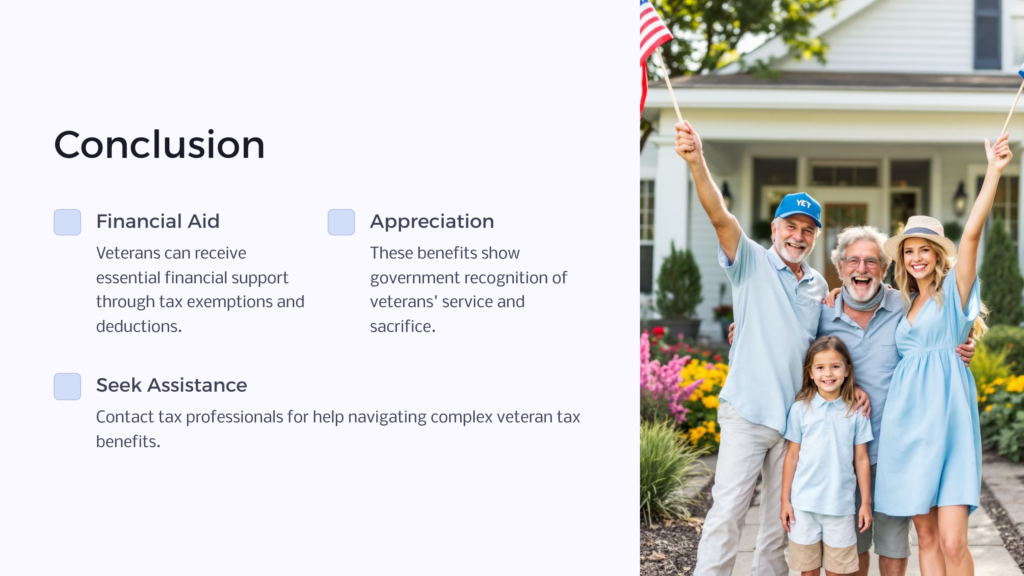The United States government owes everything to the brave men and women who have served in our military forces. Therefore, it is only fitting to continue providing veterans with benefits and services that will aid them in transitioning back into civilian life.
One such benefit that many veterans are unaware of is the potential tax relief they may receive when paying property taxes—but what exactly do these property tax exemptions look like?
This guide will explore how veterans can save money on property taxes and the regulations associated with such exemptions.
Are Veterans Required to Pay Property Taxes?

If you’re a veteran, you might be curious about whether you must pay property taxes. After all, paying property taxes is a crucial factor in navigating homeownership.
Veterans may be eligible for a property tax break on their primary residence based on the disability rating, city, and state in which they reside. The amount of the exemption can vary depending on location.
Most states in the United States offer veterans exemptions; it is vital to research your local regulations to determine what you may be eligible for.
Keep in mind that these exemptions vary considerably depending on location. What one veteran receives in Michigan isn’t necessarily available to a veteran just across the way in Ohio. Talk to someone at your local Regional Office or Housing Authority and ask if a property-based exemption could suit you.
What Is the Veteran Property Tax Exemption Law?
All states that offer property tax exemption have a veteran property tax law that allows qualifying veterans to have a reduction in their property taxes.
This veteran property tax law can substantially reduce the property tax due for those who meet specific qualifications.
Qualifying individuals may be exempt from paying all or a portion of the property taxes imposed on their properties. In addition, a surviving spouse who remains unmarried may also be privy to potential tax advantages.
Veterans should take ample time to research the laws in their state and determine if they qualify for such benefits. Fully disabled veterans in Alabama, Arkansas, Florida, Hawaii, Illinois, Iowa, Maryland, Michigan, Nebraska, New Hampshire, New Jersey, New Mexico, Pennsylvania, South Carolina, Oklahoma, Texas, or Virginia may be eligible for a full property tax exemption.
How To Apply for a Property Tax Exemption

A veteran from the armed forces or any government branch can apply for a property tax exemption by filling out an appropriate form.
Most of the time, states who offer such exemptions will provide these forms online (i.e., Disabled Veteran Tax Exemption Application) or at the local county office.
The veteran should be prepared to submit documents the state requires, such as a Certificate of Disability, military discharge forms, and other papers that prove eligibility.
Here are some essential aspects to bear in mind regarding property tax exemptions:
-
Generally, exemptions include veterans and disabled veterans and Homesteads for those over 65
-
Not all veterans and homeowners are eligible for these exemptions.
-
Exemptions can vary by county and state.
-
You must reapply for your exemption benefits every year to maintain them.
In Which States Are Veterans Exempt From Tax?
Each state that offers property tax exemptions has unique criteria for who is eligible to receive the exemption. Still, all of them are designed to provide additional financial support to those who have served in the military.
Some states also offer additional benefits, such as a tax credit for veterans or special tax exemptions for surviving spouses.
Investigating the applicable state laws is essential to determine if you are eligible for a property tax exemption and how much of an exemption you can receive. Even if your case does not qualify for a property tax exemption, you may take advantage of other beneficial taxes.
Do Veterans Pay Income Tax?

The federal government and individual states recognize veterans’ services by offering them tax relief. These military-associated tax benefits are divided into three categories:
-
Federal Income Tax Exclusions: By omitting certain types of income, veterans can enjoy the advantage of tax exemptions that could reduce their tax liability or expand their tax refund. These exemptions may also influence the amount of any applicable credits they receive.
-
State Income Tax Relief: To honor and recognize military members and veterans, many state governments provide tax-exempted income types that may be omitted from gross revenue estimates.
-
Other Non-Taxable State Benefits: Besides tax savings, many states provide invaluable non-taxable benefits to veterans and former service members. For example, property taxes are often fully or partially exempted from military personnel’s primary homes in certain areas.
You may need to consult a tax professional to determine your eligibility for any of these exemptions. The Veterans Affairs (VA) website can also provide additional information and resources.
Conclusion

With military and retirement pension taxes and property tax exemptions, veterans can receive essential financial aid from the government for their valiant service. Veterans should familiarize themselves with applicable laws to capitalize on these valuable benefits.
Through these deductions, the government is showing its appreciation for the brave men and women who have served this country with honor and courage.
We can help you navigate the complexities of filing taxes and ensure that you consider all potential deductions and exemptions. Contact us today to learn more about tax relief for veterans.
 Benefits.com Advisors
Benefits.com Advisors
With expertise spanning local, state, and federal benefit programs, our team is dedicated to guiding individuals towards the perfect program tailored to their unique circumstances.
Rise to the top with Peak Benefits!
Join our Peak Benefits Newsletter for the latest news, resources, and offers on all things government benefits.





















